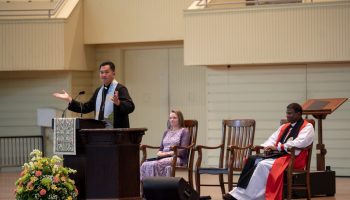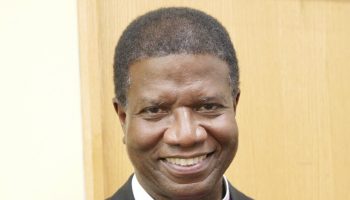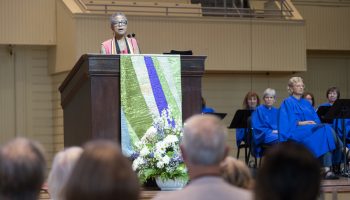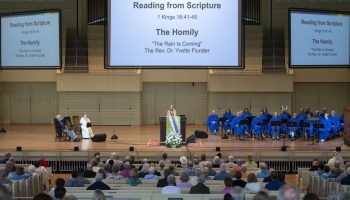“Death makes us mortal, facing death makes us human. If we walk forward with a common hope, we will know the marks of the new age and they will lead us,” said the Rev. Robert Allan Hill at the 9:15 a.m. Monday morning service of worship.
His sermon title was “Marks of the New Age,” and the Scripture reading was 1 Corinthians 15:19-26. His theme for the week is “Toward a Common Hope.”
Hill began his sermon by reciting “A New Creed (1968)” from the United Church of Canada. It begins with “We are not alone” and ends with “In life, in death, in life beyond death, God is with us. We are not alone.”
“The last enemy to be destroyed is death,” Hill said, quoting 1 Corinthians 15:26. “The marks of the new age are hidden in the old, and disciples are daily bearing the cross and daily facing death.”
He told the congregation that “we still walk by faith.” We have treasures in earthen vessels, we see in the mirror darkly and we hope for what we do not see.
Think of your gravest day, he said, and therein by grace are the marks of memory, prayer and love, the marks of the new age that give life.
Hill recalled the Patriot’s Day bombing of the Boston Marathon that took place on April 15, 2013. The day is usually a “26-mile family picnic, and it is my job to get the undergraduates out of bed before the marathon goes by.”
As dean of Marsh Chapel at Boston University, Hill and his wife serve brunch, the group recites patriotic songs and poems and then they go out to see the end of the race. They heard the explosions and knew it was a grave day. The Marsh Chapel staff provided blankets to people who were cold, water for those who were thirsty, counsel and conversation, and let people use their landlines to make phone calls because there was no cellphone reception.
Someone came in and said that a student had been hurt, and the police came to take Hill to the hospital. The student asked where her friend was. That friend had been killed.
The week was full of events — on Thursday President Barack Obama came, on Friday they sheltered in place, on Saturday there was a performance of Messiah by George Frideric Handel.
On Wednesday, a reporter from the Philadelphia Inquirer came by with a photographer. As the reporter was asking questions, the photographer dropped his camera and said, “Bob.” The photographer, Clem Murray, was a high school classmate of Hill’s. They had not seen each other since high school graduation in 1972.
Hill asked about Murray’s high school sweetheart, whom he had married, and Murray said she had died two years before.
“In the midst of the turmoil, we shared a memory that carried us out of the moment and gave us hope,” Hill said. “Marcel Proust said that memory is the resurrection of the past. It is a mark of the new age.”
Prayer is also a mark of the new age. There was a memorial service for the student who had died in the bombing and 18 members of her family were there. Hill said it was a “very Methodist” service with words and music, followed by words and music, words and music. The readings were from the Bible and from Confucius.
At the point in the service where the family was supposed to leave and go to the ready room, they did not move. There was a long time of silence, and then they got up and bowed to honor their daughter’s life.
“It was an unspoken prayer, and prayer gives life and is a mark of the new age,” Hill said.
Rabbi Abraham Heschel said that there are different languages of prayer but the “tears are the same.”
Love is another mark of the new age. One Sunday, as Hill prepared for worship, an assistant came in and told him a graduate student had died in a fire. The woman’s mother was coming from New York City by bus. Hill and the dean of students, Kenneth Elmore, went to the bus to meet her.
Hill stepped forward to offer their condolences, but the mother said: “I brought her favorite rice cake. What hospital is she in? Take me to see her.” It took Hill several tries to finally get the woman to understand that her daughter was dead.
“Like Rachel wailing over Jerusalem, her cries carried on forever across the bus station,” he said. Elmore reached out and literally lifted the woman and hugged her tightly until she gradually started to breath again and the crying stopped.
“It is embodied love that gives life,” Hill said.
He quoted the poet Miguel de Unamuno: “Warmth, warmth, more warmth! For we are dying of cold and not of darkness. It is not the night that kills, but the frost.” He changed the final phrase to “It is the frost of unloving that is killing.”
On our gravest days, he said, we turn to memory, prayer and love. He closed by reciting the Apostles’ Creed.
The Rev. Robert M. Franklin Jr. presided. The Rev. Carmen Perry, pastor of the Hurlbut Memorial Church at Chautauqua and leader of the Thursday evening Bible study at the Methodist House, read the Scripture. The Motet Choir sang “Listen, sweet dove” with music by Grayston Ives and words from the poem “Whitsunday” by George Herbert. Jared Jacobsen, organist and coordinator of worship and sacred music, directed the choir. Gary and Willow Brost provide support for this week’s services.




